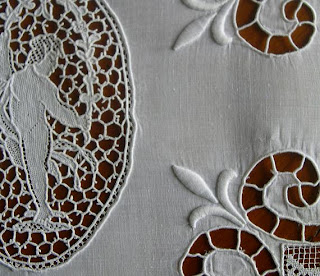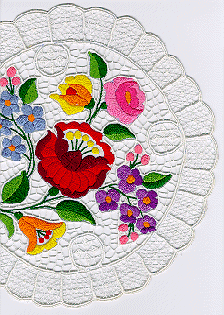 Broderie Anglaise
Broderie Anglaise, or English Embroidery is a
Whitework technique, designs sewn with a white thread onto a white fabric.
It is first mentioned in books as coming to England in the 1820's. It does
not say where from, but I feel it may have developed from the fine Ayrshire
Needlework which had tiny eyelet holes worked among the delicate f
loral embroidery. This
embroidery was time-consuming, worked by women in their
homes as poorly paid out-workers. It had raised satin-stitch and some
needle-lace fillings in the larger holes as part of the design.
It was much quicker just to work the eyelet holes on their own. Little ones are worked by piercing the cloth with a stiletto, a sharp-pointed tool, then over-sewing round the resulting hole. Then the holes became bigger, which meant they had to be cut out after sewing round the shape, circle or oval.
This was done by snipping with sharp pointed scissors, from side to side and top to bottom of the shape without cutting the outline thread. The fabric flaps were turned under, then the hole over-sewn or button-holed. Not as difficult as it sounds.
The designs were very lacy, in fact as time went on the patterns developed into cut-work, where more fabric was cut away than was left. These larger holes were always filled with needle-lace stitches, or whipped or
buttonhole bars, often with picots.
You might also be interested in:




























































